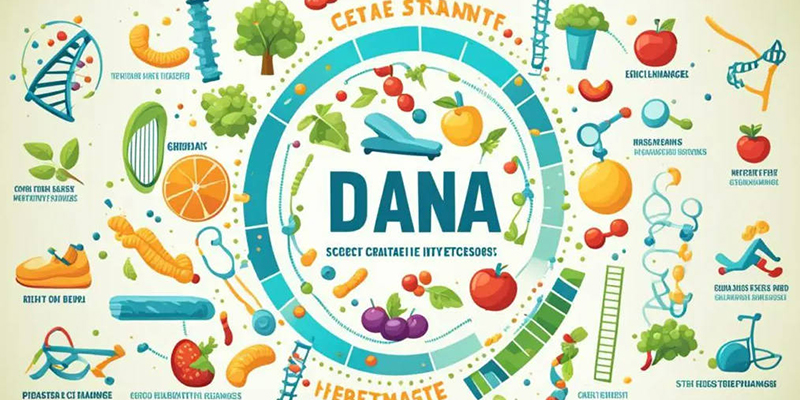Epigenetics is an avant-garde discipline within biological sciences. It elucidates the profound ramifications of irrelevant stimuli, such as dietary consumption, on genomic expression without altering the quintessential DNA sequence. Within the gestational paradigm, epigenetics in pregnancy acquires paramount significance as it orchestrates the intricate developmental trajectory of your progeny's health.
How Diet Influences Baby’s DNA
Decisions about alimentation during the gestational epoch greatly influence your offspring's genetic configuration. The nutrients and bioactive phytochemicals embedded within ingested victuals possess the potential to catalyze epigenetic modulations, thereby orchestrating gene expression in a deterministic manner. For instance, a diet saturated with folate, vitamin B12, and other indispensable micronutrients is acclaimed for augmenting DNA methylation—an epigenetic fulcrum critical for regulating gene activity. Conversely, suboptimal dietary regimens may precipitate pernicious epigenetic deviations, thereby amplifying the susceptibility of your progeny to deleterious health sequelae in subsequent stages of life. This elucidates the profound interdependence between diet and baby DNA.

Essential Nutrients And Their Epigenetic Effects
Folate and B Vitamins are instrumental in effectuating DNA methylation, a process quintessential for the precise regulation of gene expression.
- Omega-3 Fatty Acids: Integral to neurodevelopment, these fatty acids may modulate the expression of genes implicated in neurophysiological functionalities.
- Choline: A critical determinant of cognitive maturation, with empirical evidence corroborating its influence on the modulation of gene expression germane to mental faculties.
- Antioxidants: These entities furnish protection against genomic insults and may modulate the expression of genes involved in cellular respiration and senescence.
The Impact Of Malnutrition On Genetic Expression
Nutritional deprivation or an asymmetrical dietary regimen during gestation can engender adverse epigenetic reconfigurations. Such alterations may predispose your progeny to chronic pathophysiological conditions such as adiposity, mellitus, and cardiovascular derangements. For instance, a lack of essential nutrients may culminate in the hypomethylation of specific loci, thereby engendering the overexpression of genes implicated in pathological susceptibilities.
Potential Risks From Poor Diet Choices
- Escalated Risk of Adiposity: Suboptimal dietary practices can precipitate epigenetic alterations that exacerbate the propensity for adiposity in the offspring.
- Augmented Susceptibility to Mellitus: Nutritional inadequacies can modulate gene expression, heightening the propensity for developing mellitus.
- Cardiovascular Derangements: A dietary regimen deficient in essential nutrients may precipitate epigenetic alterations that predispose the progeny to cardiovascular afflictions in subsequent stages of life.
Practical Guidelines For A Healthy Pregnancy Diet
Adherence to a nutritionally replete and balanced alimentary regimen during gestation constitutes a productive strategy for modifying your offspring's DNA. Herein are some cardinal guidelines to adhere to:
- Incorporate a Multifarious Spectrum of Nutrients: Prioritize a dietary regimen encompassing a comprehensive array of essential vitamins and minerals.
- Opt for Whole, Unadulterated Foods: To maximize nutritional intake, eschew processed comestibles in favour of unadulterated, whole foods.
- Ensure Adequate Hydration: Sufficient hydration is paramount for the optimal assimilation of nutrients and overall physiological well-being.
- Moderate Saccharine and Saturated Fats: Curtailing these can mitigate the risk of adverse epigenetic modulations associated with metabolic disorders.
Long-Term Implications Of Pregnancy Nutrition
Dietary decisions made during gestation transcend immediate benefits, imparting enduring genetic repercussions. Epigenetic alterations engendered by maternal diet can be perpetuated across generations, thereby amplifying the salience of the nexus between pregnancy nutrition and genetics. For instance, a maternal dietary regimen saturated with essential nutrients can instil propitious epigenetic modifications, potentially diminishing the susceptibility of subsequent generations to genetic disorders.
Benefits Of A Balanced Pregnancy Diet
- Augmented Cognitive Acumen: A balanced alimentary regimen can engender gene expression pertinent to neurodevelopment, thereby enhancing cognitive outcomes for the progeny.

- Fortified Immune Competence: Adequate nutrition fosters the expression of genes integral to immune functionality, thereby mitigating the risk of infectious pathologies.
- Optimized Metabolic Equilibrium: A nutritionally dense diet can regulate the expression of genes governing metabolic homeostasis, thereby reducing the likelihood of metabolic derangements.
The Influence Of Maternal Micronutrients On Epigenetic Regulation
Amid gestational development, the maternal ingestion of pivotal micronutrients exerts an indelible influence on the epigenomic architecture, intricately modulating the expression profiles of specific genes. This multifaceted process underscores the profound significance of epigenetics in pregnancy and the consequential role of diet and baby DNA in dictating lifelong health trajectories.
Trace Elements And Epigenetic Modulation
- Zinc: Zinc is an indispensable cofactor for myriad enzymatic reactions integral to DNA synthesis and reparative processes, thereby preserving genomic sanctity. Its adequate bioavailability is paramount for the optimal functionality of epigenetic machinery.
- Selenium: As a critical trace element, selenium is essential in safeguarding DNA against oxidative perturbations, which can precipitate epigenetic dysregulation and aberrant gene expression.
- Iodine: Crucial for the biosynthesis of thyroid hormones, iodine orchestrates the regulatory mechanisms of epigenetic pathways, influencing the ontogeny of the fetal cerebrum and other vital systems.
Implications For Fetal Development
The adequacy or lack of these trace elements within the maternal alimentary regimen exerts a sustained influence on the epigenetic governance of gene expression within the fetus. This nexus elucidates the intricate interplay between pregnancy nutrition and genetics, accentuating the necessity for meticulous dietary orchestration during gestation.
Epigenetic Memory And Transgenerational Inheritance
The paradigm of epigenetic memory postulates that specific epigenetic configurations can be perpetuated across generational lines, thereby influencing the immediate progeny and successive descendants. This phenomenon accentuates the enduring impact of epigenetics in pregnancy on future lineages' longitudinal health and well-being.
Mechanisms Of Epigenetic Inheritance
- DNA Methylation: This quintessential epigenetic mechanism can be heritable and perpetuated across generational intervals, thereby modulating gene expression paradigms within progeny.
- Histone Modification: Epigenetic alterations to histone complexes, which facilitate chromatin packaging, can be transmitted intergenerationally, modulating the genomic expression profiles of subsequent descendants.
- Non-Coding RNAs: These regulatory molecules profoundly influence gene expression modulation and are implicated in the transgenerational transmission of epigenetic information.
Practical Implications For Future Generations
Deciphering the mechanisms underpinning epigenetic inheritance underscores the imperative of maternal nutritional diligence during gestation. A dietary regimen that fosters salutary epigenetic modifications can positively impact diet and baby DNA, potentially ameliorating health outcomes across multiple generational strata.
The Role Of Phytochemicals In Epigenetic Regulation
Phytochemicals, the bioactive constituents inherent in botanical sources, have been demonstrated to modulate epigenetic pathways intricately. This paradigm introduces an additional dimension of complexity to the interplay between pregnancy nutrition and genetics.
Essential Phytochemicals And Their Effects
- Curcumin: This polyphenolic compound, derived from turmeric, has been evidenced to influence DNA methylation and histone remodelling, thus exerting control over gene expression dynamics.
- Resveratrol: Predominantly found in Vitis vinifera and various berries, resveratrol functions as a potent activator of sirtuin enzymes, which govern pivotal epigenetic processes, including histone deacetylation.
- Sulforaphane: Endemic to cruciferous vegetables, sulforaphane inhibits histone deacetylase activity, thereby promoting a chromatin configuration conducive to enhanced gene transcription
Conclusion:
By deciphering the intricate interrelationship between diet and baby DNA, expectant mothers can make wise dietary choices that positively sculpt the genetic destiny of their progeny. The dynamic interplay between epigenetics in pregnancy and pregnancy nutrition and genetics accentuates the criticality of a nutritionally rich diet during gestation, not solely for the immediate well-being of the offspring but also for their lifelong health and the health of future progeny.







